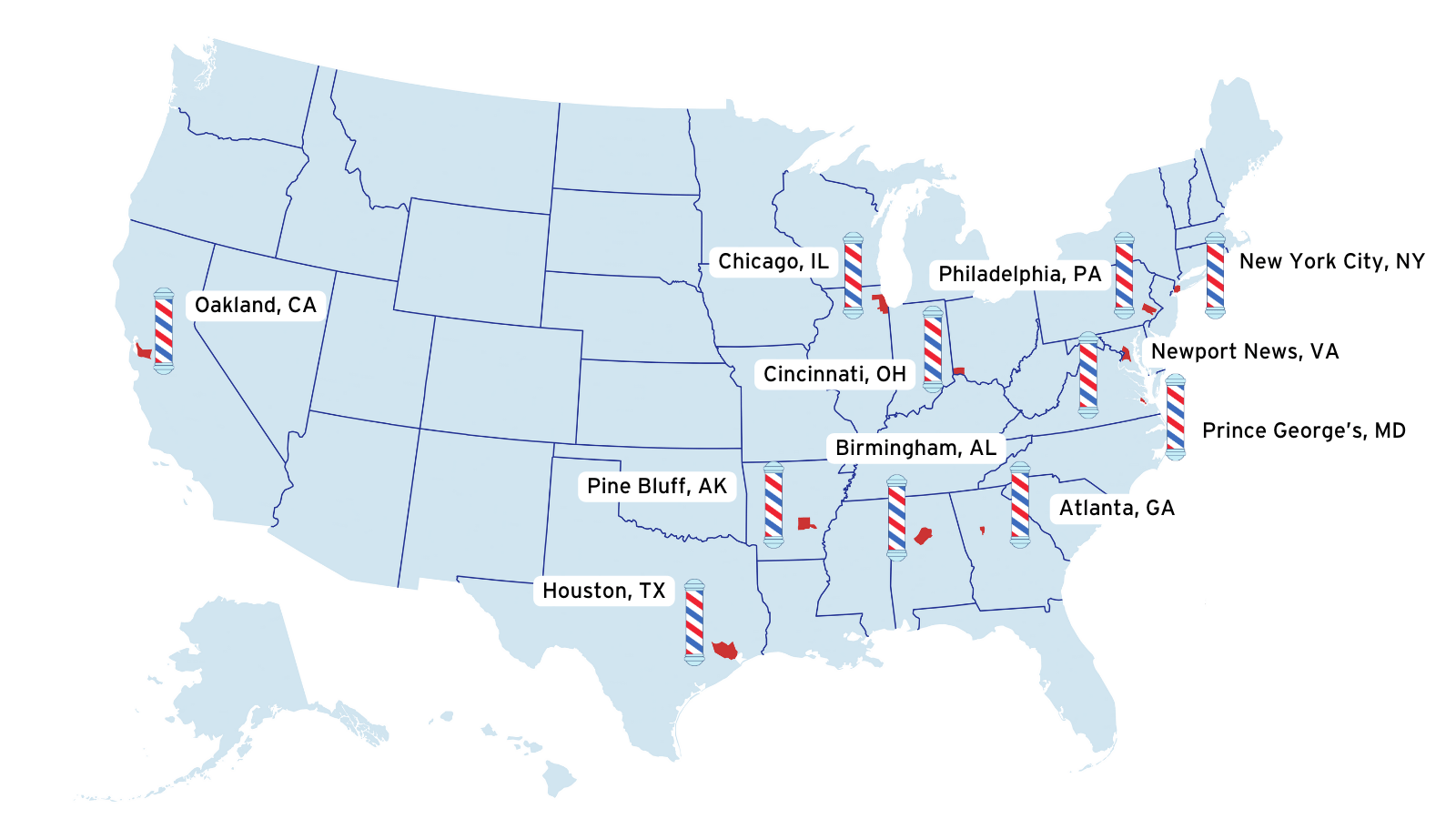The Health Advocates In-Reach and Research (HAIR), is a community-based intervention developed by Dr. Stephen B. Thomas and a team of researchers from the Maryland Center for Health Equity at the University of Maryland’s School of Public Health in College Park. The primary aim of HAIR is to create an infrastructure to engage barbershops and beauty salons in Prince George’s County, Montgomery County and Baltimore City as culturally relevant portals for health education and delivery of public health and medical services in the community.

Background
HAIR builds upon the rich and powerful history of barbers and beauticians as trusted entrepreneurs providing essential services to the African American community. Barbershops and beauty salons also represent private sector business partners dedicated to improving the quality of life in the neighborhoods they serve. Medical and public health research has proven that barbershops and beauty salons can be mobilized as venues for the delivery of health promotion and disease prevention services designed to eliminate health disparities and advance health equity.
<iframe width="560" height="315" src="https://www.youtube.com/embed/nDDTm_IaMbA" title="YouTube video player" frameborder="0" allow="accelerometer; autoplay; clipboard-write; encrypted-media; gyroscope; picture-in-picture" allowfullscreen></iframe>
The Colors of COVID-19: Barbershop & Salon Vaccination Outreach and Education Campaign for the State of Maryland is supported by a grant from the Maryland Department of Health.
We are Maryland Barbers and Stylists United for Health. We have come together from Prince George’s County, Montgomery County and Baltimore City to protect ourselves, our clients, family and loved ones from ravages of the COVID-19 pandemic in our community. We will be providing education and outreach through Barbershops and Salons.
With financial support from the Cigna Foundation, the HAIR network is focusing on promoting colorectal cancer screening and increasing awareness about colorectal cancer, a leading cause of disability and premature death in the African American community. Colorectal Cancer (CRC) starts in the colon or rectum and is the second deadliest cancer in the US. African Americans have the highest rates of colorectal cancer and are the most likely to die from the disease. Early detection through screening, including colonoscopy, has been proven to save lives. However, far too many people from African American backgrounds are not being screened.
In March of 2015, the clinical team from Capital Digestive Care (CDC) joined the M-CHE and Cigna in their campaign to address disparities in colon cancer screening among African Americans in Prince George's County by offering colonoscopy screenings to people reached through the program.
The specific objectives of the HAIR colorectal cancer screening project include:
- Expansion of the HAIR network of barbershops and beauty salons in Prince George’s County, especially neighborhoods in the Health Enterprise Zone (HEZ)located in zipcode 20743.
- Provide formal training to barbers and stylists as Lay Health Advocates who are willing to promote colorectal cancer screening to their clients.
- Training a team of Genetic Counselors to become more culturally confident so they can conduct Family Health Histories (FHH) with people in the HAIR barbershops and beauty salons.
- Establishment of a sustainable model to transform both the barbershops and beauty salons into health promotion and disease prevention venues where medical and public health professionals are invited to deliver life-saving services.
Approach:
- 10 owner-operated barbershops ( 8 barbershops and 2 beauty salons) have joined the HAIR network
- 40 barbers/hairstylists have completed the Lay Health Advocate training on colorectal cancer
- Two workshops will be convened to train barbers/stylists (5 hours total)
- 25 participants per shop to be recruited for health promotion about colorectal cancer
- Eligible participants: African Americans 45 years or older with no previous diagnosis of colorectal cancer
- Participants will participate in a family health history conducted by genetic counselors. Follow-ups will be done at one, six, and twelve months to determine any change in knowledge and/or screening behavior
Since February 2015, M-CHE has partnered with Adventist HealthCare’s Center for Health Equity & Wellness (CHEW) to provide blood pressure, carbon monoxide and body composition screenings directly to barbers, stylists and their customers during shop business hours. Between February and October 2015, 209 blood pressure screenings; 156 carbon monoxide screenings; and 63 body composition screenings were conducted by CHEW.
This study aims to describe the health status, health behavior support and the physical activity support networks of African American women. These networks will then be examined to determine if vary by age. Finally, we will assess whether African American women who are active have more supportive physical activity networks compared to women who are less active.
Recruitment for this research project was conducted in the HAIR network barbershops.
This pilot study funded by the FDA utilized the HAIR network to recruit participants. The goal of this project is to explore the public understanding of FDA communications and knowledge of FDA terminology and examine the public response to research on medical countermeasures in the context of a public health emergency.
The Black Men’s Health Initiative included interviewing Black men to assess their knowledge, attitudes and beliefs toward participation in research, family health, fatherhood, and other topics related to physical and mental health well-being.
Recruitment for this research project was conducted in the HAIR network barbershops.
The broad purpose of this study is to uncover new factors responsible for lower immunization rates in African American adults and test the effectiveness of new communication materials to increase routine and emergency immunization.
Recruitment for this research project was conducted in the HAIR network barbershops.
We partnered with an external team of researchers within our School of Public Health to implement a study examining the differences in levels of oral bacteria between tobacco users and non-tobacco users.
Recruitment for this research project was conducted in the HAIR network barbershops.